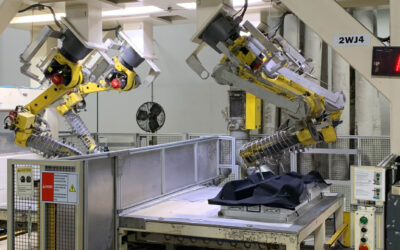The La Granaudière renewable energy project is currently underway in the Saint Michel des Saints region of Québec. The project involves constructing and operating a wood pellet plant capable of producing 200,000 metric tonnes of pellets annually, to be sold primarily in Europe. After more than five years of planning, the development broke ground in September of 2019 and is expected to be complete by end of the summer of this year.
In recent years, the decline of the pulp and paper industry has had a devastating effect on the forestry economy across Canada, but particularly in Québec. The provincial government is actively seeking innovative alternatives, and wood pellet production has become a key consideration for the future of the forestry sector.
Wood pellets are an organic biofuel and are made by compressing sawdust into small granular pieces that can be burned in a furnace to generate heat, and this can also be converted into green energy to generate green electrical power. This process emits fewer pollutants when compared to other forms of combustion heating, and wood is preferable to many conventional, non-renewable resources as trees can be regrown. La Granaudière is a perfect test case.
The village of Saint Michel des Saints is located on the southern edge of an immense forest, and it has a long history in forestry, lumber, and wood processing. In 1989, a wood processing company came to Saint Michel des Saints looking for a place to build a new facility, and the region became home to an oriented strand board (OSB) mill that employed just over two hundred local residents and produced roughly 500 million square feet of OSB annually.
The community has a workforce with a great deal of expertise in these fields, but in recent years, the decline of the pulp and paper industry has created instability in the local economy. Rising wood and fuel costs, combined with a steep decline in the price of OSB put the company in a poor enough position that it was forced to shut the facility down at the end of 2007, and an adjacent sawmill owned by the same company was sold off.
A mix of hardwood and softwood is harvested from Québec forests every year, and traditionally, the hardwood would be sold primarily to customers in the pulp and paper industry. As that industry continues to decline, the Québec forest ministry is left uncertain about what to do with the extra hardwood stock. To protect the sustainability of forestry operations, the policy of the ministry is to only provide permits to wood harvesting companies if there is a designated application for the entire harvested crop of trees.
As a result, large portions of the hardwood forests that would have previously been collected are now over-mature and beginning to degrade. La Granaudière will help to solve this problem by creating a new application for that crop. “They call that the frozen forest because there are no permits for how to use that wood, so we are going to defrost those over-mature areas. Then we will be participating in the sustainability of the forest by reducing emissions of GHG (greenhouse gases). To a certain extent, we are the test case for the government of Québec,” said La Granaudière Project President and Chief Executive Officer Yves A. Crits.
This project will also help to improve sustainability by providing an application for branch waste. Traditionally, tree harvesting resulted in branches being left behind on the forest floor. As they decompose, a great amount of carbon is released into the surrounding environment. La Granaudière has plans to harvest those branches so that they can be processed into wood chips. “By reusing forest chips, we are going to provide a use for low-value wood, reducing even further the impact of GHG emissions and improving further the sustainability of the forest,” said Yves.
More than a decade after the Louisiana Pacific OSB plant closed down putting more than two hundred people out of work, La Granaudière has demonstrated a plan to revitalize the local economy and community. It will be bringing approximately fifty new jobs to the area within the production plant itself and 180 total jobs including forestry operation and logistics.
La Granaudière is located on a four-hundred-acre plot of industrial land that is 1.5 kilometres from the nearest home and four kilometres from the local sawmill, with direct access to logging roads. This means that the facility will not only have a highly-skilled workforce, but it will be connected to incoming transport forest routes for renewable, competitively-priced feedstock both as raw logs from the forest and residue from the local sawmills.
As well as the proximity to logging roads for incoming raw material, Saint Michel des Saints is also an ideal location for outbound transport. The facility is located near a deep-water port on the St. Lawrence River with a shipping route connecting it to the European market. A dedicated fleet of trucks will run continuously transporting pellets between the plant and the port.
In Québec, the independent chief forester is in charge of determining the maximum sustainable volume of wood that can be perpetually harvested, and the forest ministry is then in charge of portioning that harvest to companies under supply guarantees. The ministry has granted La Granaudière a right to cut hardwood for approximately 75 percent of its needs. This agreement enables the developers to offer supply chain and competitive price security to its customers by also mitigating take-or-pay risk.
After five years of in-house development, the project began at the end of August 2019. All of the engineering, procurement, and construction contracts were already signed and activated immediately at financial close. Three contractors: Québec City-based Shuot Inc., Player Design Inc. of Maine, and Law Marrot Milpro from Sainte Hyacinthe, Québec were all hired to work on various aspects of the project and broke ground last September. Due to the thorough preparatory planning, work is now moving swiftly, and the facility is expected to be at starting capacity by September of this year and at full production by 2022.
One of the most significant difficulties facing the La Granaudière project is finding sufficient manpower. Currently, Québec’s unemployment rate is below five percent, which is the lowest it has ever been since the statistics were first compiled in 1976 and lower than any other province, and this has made finding qualified labour a challenge for the company.
The project developers have devised an innovative solution to this problem. “We are going to bring back the people who had to leave to find work outside the village when the Louisiana Pacific plant closed down in 2007. We are going to increase the quality of life for those people by having them come back home to where they were living before,” says Yves.
The La Granaudière facility will have the ability to process a range of raw materials on-site into four grades of wood pellet products. It will de-bark raw logs, chip branches, and compress residues from sawmills. For home heating, it will offer a premium quality pellet that generates very little ash. For district heating, it will offer a secondary, low-to-moderate ash grade product. Finally, for industrial power generation, it will offer two grades of moderate and high-ash pellets. All of these products will receive comprehensive screening to ensure that they meet the quality standards demanded by customers and work toward achieving Sustainable Biomass Program and ENPlus certifications.
As the declining pulp and paper industry brings ongoing economic uncertainty to many regions in Québec, the La Granaudière project is on track to give new life to the forestry sector. “There are two major activities in the village of Saint Michel des Saints: tourism and forestry. We are going to revive the village by recovering the prosperity of the area,” Yves stated confidently.













